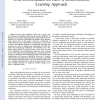Free Online Productivity Tools
i2Speak
i2Symbol
i2OCR
iTex2Img
iWeb2Print
iWeb2Shot
i2Type
iPdf2Split
iPdf2Merge
i2Bopomofo
i2Arabic
i2Style
i2Image
i2PDF
iLatex2Rtf
Sci2ools
128
click to vote
CCGRID
2008
IEEE
2008
IEEE
Grid Differentiated Services: A Reinforcement Learning Approach
—Large scale production grids are a major case for autonomic computing. Following the classical definition of Kephart, an autonomic computing system should optimize its own behavior in accordance with high level guidance from humans. This central tenet of this paper is that the combination of utility functions and reinforcement learning (RL) can provide a general and efficient method for dynamically allocating grid resources in order to optimize the satisfaction of both endusers and participating institutions. The flexibility of an RLbased system allows to model the state of the grid, the jobs to be scheduled, and the high-level objectives of the various actors on the grid. RL-based scheduling can seamlessly adapt its decisions to changes in the distributions of inter-arrival time, QoS requirements, and resource availability. Moreover, it requires minimal prior knowledge about the target environment, including user requests and infrastructure. Our experimental results, both on a s...
Autonomic Computing | CCGRID 2008 | Cluster Computing | Minimal Prior Knowledge | Scale Production Grids |
Related Content
| Added | 29 May 2010 |
| Updated | 29 May 2010 |
| Type | Conference |
| Year | 2008 |
| Where | CCGRID |
| Authors | Julien Perez, Cécile Germain-Renaud, Balázs Kégl, Charles Loomis |
Comments (0)

